Lung Cancer Screening: An Essential Guide for Your Health

Lung cancer screening is a critical component in the early detection and treatment of lung cancer, which significantly enhances the chances of positive outcomes for patients. Understanding the importance of lung cancer screening is essential for anyone who wants to prioritize their health and take proactive measures against this formidable disease.
What is Lung Cancer Screening?
Lung cancer screening involves tests that can help detect lung cancer at an early stage when it's often more treatable. The most common method used for lung cancer screening is the low-dose computed tomography (LDCT) scan. This type of imaging allows for detailed pictures of the lungs, revealing abnormalities that may indicate cancer.
Why is Lung Cancer Screening Important?
Early detection of lung cancer can dramatically improve survival rates. Here are several reasons why getting screened is vital:
- Reduced Mortality: Studies show that annual screening can reduce lung cancer mortality by up to 20% in high-risk populations.
- Early Intervention: Detecting lung cancer early allows for timely treatment, which may involve surgery, chemotherapy, or radiation.
- Informed Health Decisions: Screening results empower patients to make informed decisions regarding their health.
- Customized Care: Results from screenings can help healthcare providers tailor prevention and treatment strategies to individual needs.
Who Should Consider Lung Cancer Screening?
Lung cancer screening is specifically recommended for certain high-risk groups, including:
- Individuals aged 50 to 80 years.
- Current or former smokers with a history of smoking 20 pack-years or more.
- Individuals who have quit smoking within the past 15 years.
- People who exhibit symptoms that warrant further investigation, such as a persistent cough or unexplained weight loss.
The Lung Cancer Screening Process
The process for lung cancer screening typically involves the following steps:
1. Initial Consultation
Discuss your risk factors and medical history with your physician. This will help determine if you are a candidate for screening.
2. Imaging Test
If screening is deemed appropriate, you will undergo a low-dose CT scan. This imaging should only take about 10 to 15 minutes and does not require any invasive procedures.
3. Results Interpretation
Your doctor will review the scan results with you. If any suspicious nodules are detected, further testing may be recommended, including additional imaging or biopsies to diagnose potential cancer.
4. Follow-Up Care
Based on your results, a comprehensive care plan will be developed which may include regular monitoring or treatment options.
Risks and Considerations of Lung Cancer Screening
While lung cancer screening is beneficial, it's essential to weigh the risks:
- False Positives: There is a possibility of false-positive results, which can lead to unnecessary anxiety and further invasive testing.
- Radiation Exposure: Although minimal, the radiation from repeated scans should be considered, particularly if you require annual screenings.
- Overdiagnosis: Some nodules detected may not be harmful but could lead to overtreatment.
Integrating Lung Cancer Screening into Your Healthcare Routine
Incorporating lung cancer screening into your healthcare routine is crucial, particularly when you belong to a high-risk group. Along with screening, maintaining a healthy lifestyle can further lower your risk.
Healthy Lifestyle Choices
Consider the following lifestyle modifications:
- Quit Smoking: If you are a smoker, seek resources to quit. Smoking cessation is the most significant step you can take to prevent lung cancer.
- Healthy Diet: Adopt a balanced diet rich in fruits, vegetables, and whole grains. Antioxidants found in these foods can support lung health.
- Regular Exercise: Engage in physical activities to maintain overall health and bolster your immune response.
- Limit Exposure to Carcinogens: Be aware of environmental risks, such as radon exposure and occupational hazards.
The Role of Healthcare Providers
Healthcare professionals, including those specializing in health and medical services, sports medicine, and physical therapy, play a vital role in advocating for lung cancer screening. They can:
- Educate patients on the importance of screening.
- Encourage at-risk individuals to discuss screening options.
- Integrate screening into routine health assessments.
Conclusion: Prioritize Your Lung Health
Lung cancer screening serves as an invaluable tool in the fight against lung cancer. By understanding its significance, recognizing risk factors, and committing to a healthier lifestyle, individuals can significantly decrease their likelihood of developing lung cancer. Remember, the sooner you take action, the better your chances for a healthy future.
For more information on lung cancer screening or to explore other health services, visit Hello Physio.









